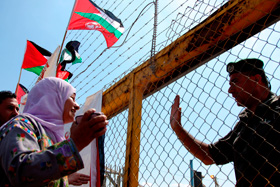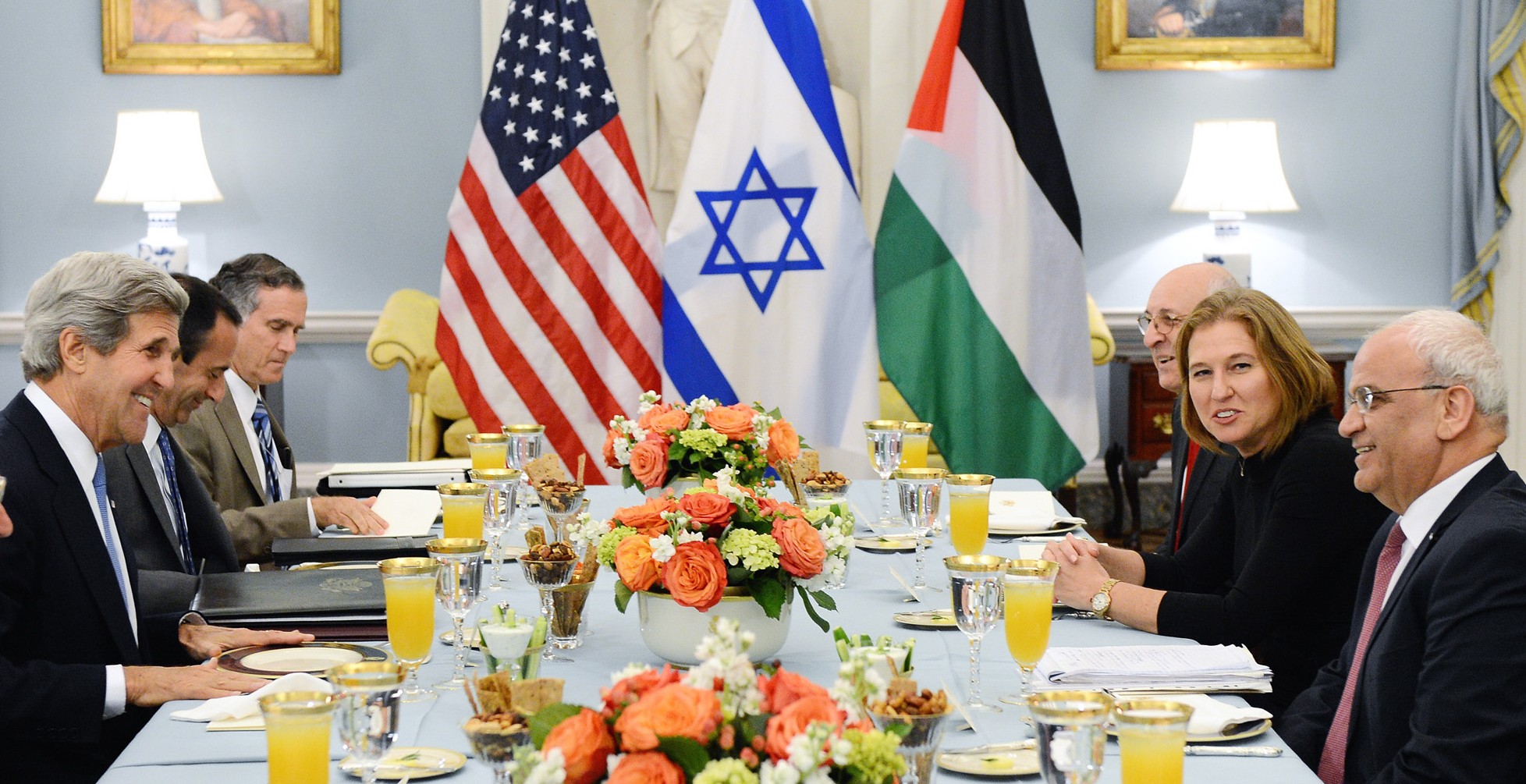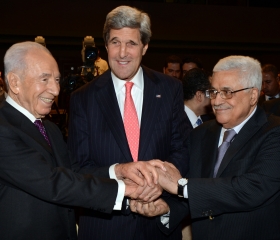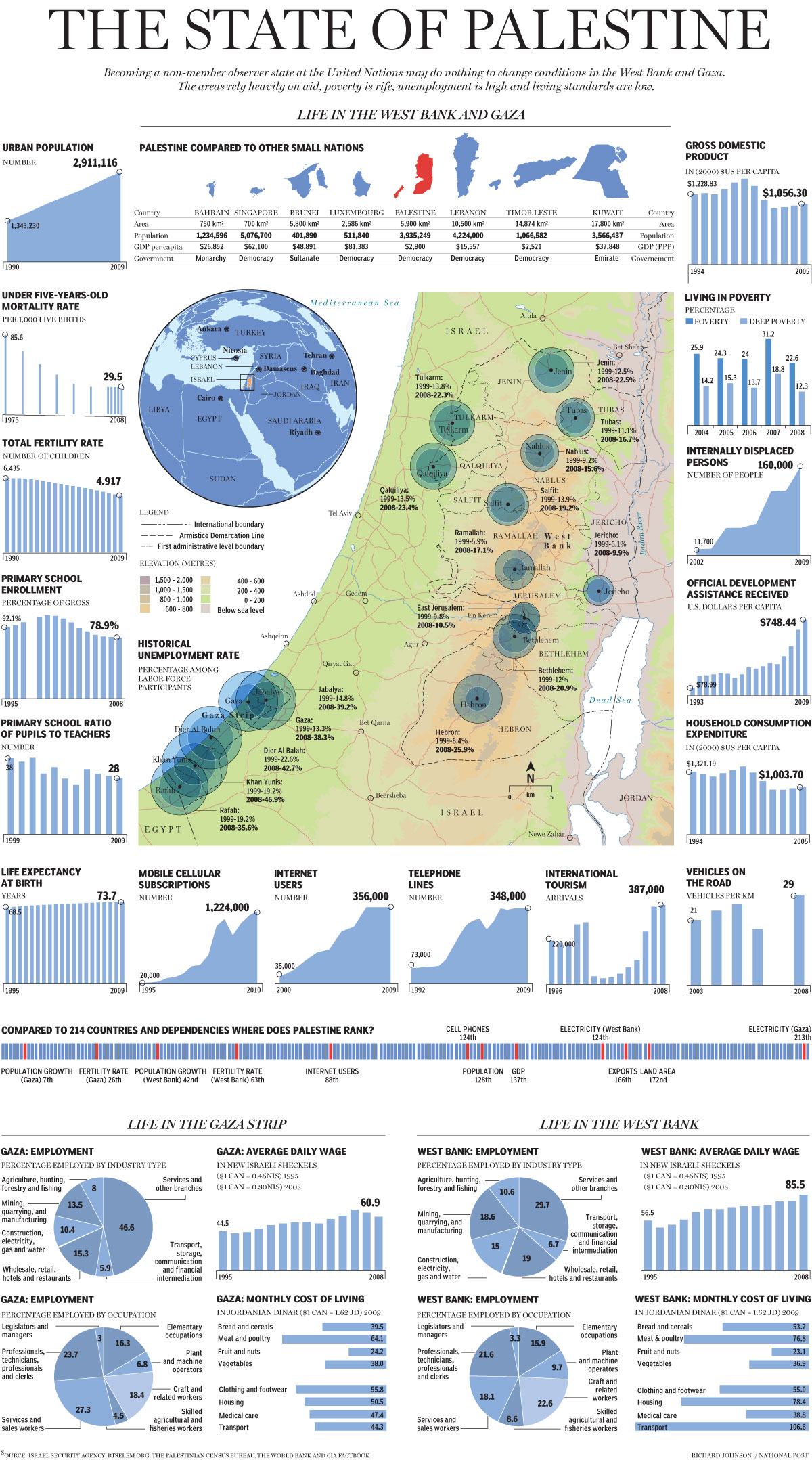Palestine-Israel Talks: Temporary Deadlock or Total Failure?
A Palestinian protester argues with an Israeli
soldier during a protest against the Israeli air
strikes in Gaza strip, at Hawara checkpoint
near the West Bank city of Nablus,
July 14, 2014
(no votes) |
(0 votes) |
PhD in History, Head of Israel Department at RAS Institute for Oriental Studies
The current deadlock is hardly the last one, since it is beneficial for both sides that have again done their best to wreck the negotiations. The failure of the U.S. initiative has ultimately proven that traditional approaches to the settlement are exhausted. Differences between Moscow and Washington may paralyze the efforts of the global community, while stronger extremist trends in the Muslim world may bring Palestine unpredictable consequences.
Once again Israelis and Palestinians are at the crossroads between negotiations and peace process crisis, between a lasting peace agreement and political stagnation. Establishment of the two states is still the main goal, requiring from both sides concessions that so far seem unattainable.
The conflict history has seen acute military confrontation and vigorous peace talks, the key achievements being the 1979 peace treaty between Israel and Egypt and the 1993 peace agreements between Israel and the Palestinian Authority (the Oslo Accords). The current military conflict has grown into a chain of terrorist acts and counterterrorist operations, most significant being the Summer Rains in 2006 and Cast Lead in 2008. Settlement has become a globalized affair, with international mediators – the Middle East quartet of the UN, the United States, Russia and the EU – working since 2002. Several settlement plans have been proposed, among them the Roadmap and the Geneva, the Egyptian and other programs, as well as the Israeli unilateral initiative, i.e. Ariel Sharon's separation wall.
However, no peace has materialized so far. The previous plans have turned unworkable, while no new approaches and ideas have surfaced to break the impasse. All previous settlement programs failed because both Israelis and Palestinians invariably attach conditions utterly unacceptable for the other side. Every fresh negotiating series was interrupted by more terrorism, bombing, missile attacks and provocations.
The current military conflict has grown into a chain of terrorist acts and counterterrorist operations.

With Barack Obama and Benyamin Netanyahu coming to power in their countries in 2009, the situation only worsened. The White House launched a proactive mediation effort with the focus on handling the Palestinian problem on the two-state principle and resumption of full-fledged talks between Israel and the administration of Mahmud Abbas [1].
Peace Initiatives Collapse
After President Obama's Middle East program had been made public, it became crystal clear that even if the talks are resumed, the conflicting parties were unlikely to try their best but would negotiate as a concession to the American and international pressure. Whereas previously the United States had been flexible about the dimensions of Israeli withdrawal from the occupied territories, this time Mr. Obama insisted on the return to the 1967 borderlines while the Israeli leaders were ready for a minimal change of the exiting frontiers. Nevertheless, after some more squeezing on the part of the White House, in summer 2009, Mr. Netanyahu agreed to the "two states for two peoples" principle in a policy speech, effectively recognizing an independent Palestine in today's borders, although with several strict conditions, i.e. demilitarization of the new state, recognition of Israel as a Jewish state, and preservation of two Israeli nixes related to the transfer of East Jerusalem – the single capital of the State of Israel – and return of Palestinian refugees to the Israeli territory [2].
Of course, this peace plan was unacceptable for the Palestinian National Authority (PNA) that insisted on the Israeli withdrawal to the 1967 borders, recognition of East Jerusalem as the capital of the Palestinian state, recognition of the Palestinians' right to return to their homeland, i.e. to Israel, and removal of Jewish settlements in the Palestinian territory, mainly in East Jerusalem and on the West Bank of the Jordan River [3].
On its part, Israel has been always sure that yielding to any of Palestinian demands contradicts the concept of national security, especially on the borderline and refugees issues, and is de facto fraught with the loss of independence.
The Arab Awakening and Inter-Palestinian Accord
The previous plans have turned unworkable, while no new approaches and ideas have surfaced to break the impasse.
The Arab Awakening has brought no significant changes to the peace process. Along with the Israeli-Palestinian settlement, the Arab world is busy with other regional problems. As a result, the PNA seems to be in a quandary because the Arab revolutions have distracted the world community from the Palestinian issue and strengthening of Islamists in many countries is worsening Mr. Abbas's ratings. The biggest damage to the Fattah came after the Israeli withdrawal from the Gaza Strip in 2005. With the rise of radical Islamist organizations, primarily the Hamas, the Fattah won the Palestinian parliamentary elections in January 2006, after which confrontation between the two built up, with the Hamas effectively grabbing the rule of Gaza. The split lasted till May 2011, when the Hamas and the Fattah signed a reconciliation agreement in Cairo. In April 2014, a national unity government was set up in Ramallah. The aim of the Palestinian reunification seems quite clear as the Hamas was weakened by the removal of Egyptian president Mohammed Morsi and was losing popularity in Gaza. The new military government of Egypt is not really happy about allies of the Muslim Brotherhood, while its relations with other sponsors, first Iran and then Qatar, also seriously deteriorated after the Arab spring.
For the Fattah, unity is strengthening the Palestinian stance at negotiations with Israel, and, more importantly, is raising their international status. It appears especially important for the PNA leaders who did not believe in reaching peace with Israel and was undertaking unilateral steps toward international legitimization of the PNA. To this end, in September 2011, Mr. Abbas applied to the UN Security Council about admission of the Palestinian State to the United Nations as a full member, and in November 2012 Palestine was given the UN observer status. Global positions of the PNA became visibly stronger, and the process of its integration in the international structures continued.
In fact, the inter-Palestinian reconciliation made the peace process even thornier, since Mr. Netanyahu rejected talks with the cabinet that includes the Hamas members. Many experts in Israel are convinced that the inter-Palestinian reunion means a victory of the Hamas terrorists who made use of the moderate Fattah's loss of its bases in Egypt and Syria.
The Latest Palestine-Israel Talks
The latest U.S.-sponsored attempt to reach a final settlement through talks took as long as nine months – from July 2013 to April 2014 – but was also a flop, with both Israelis and Palestinians rejecting even the modest plan of Secretary of State John Kerry to sign a framework agreement that might serve as a basis for a future final accord.
Mr. Kerry's proposal contained some new points, for example guarantees of Israeli border safety through a 10-year-long presence of a foreign contingent in the Palestinian territories, including deployment of Israeli and American forces [4], and a territorial swap [5]. Washington intended these new elements as a minimum concession from the Palestinians and hoped that Mr. Netanyahu would meet the traditional Palestinian demands, i.e. the return to the 1967 borders and transfer of East Jerusalem. But the plan also misfired.
This time, the negotiations failed because of actions on both sides. Israel refused to release 26 imprisoned Palestinians, while the PNA used the fact for applying to the UN with a request to have it attached to international conventions and pacts, including those under the jurisdiction of the UN commissions. Israel qualified the application as a breach of agreement on re-launching the peace talks and resumption of Palestinian efforts to obtain independence unilaterally, only to underline that intransigence remains at the core.
Alternative Settlement Plans or What to Do?
Israel that yielding to any of Palestinian demands contradicts the concept of national security and is de facto fraught with the loss of independence.
Key to all Palestinian-Israeli negotiations is the reciprocal skepticism about a final agreement. After each failure the two sides take steps to develop alternative strategies for reaching their goals by unilateral efforts. Both conflicting parties are trying to deviate from the externally imposed scenarios and find other ways to change the status quo or adapt the previous plans to the new environment.
Palestinians adamantly oppose all partial accords and obviously intend to unilaterally go ahead in garnering international support for establishment of the Palestinian State even in absence of an agreement with Israel. The new Palestinian government is vigorously recruiting the United States, European countries and international organizations to organize pressure on Israel expecting territorial concession from Israel without talks.
The Israelis are also ready to act on their own, having outlined their future unilateral steps to attain political and territorial separation from the Palestinians and creation of material grounds for implementation of the "two states for two peoples" principle. They are known to have prepared a Plan B [6] to open a transitional period for partial and temporary solutions intended to pave the way to a future final settlement. The plan is aimed to make sure a maximum painless withdrawal from the West Bank and separation of Israel and the PNA in absence of a peace treaty. In fact, it goes about the program proceeding from on the Clinton Parameters formulated in December 2000 during the talks between Americans, Ehud Barak and Yasser Arafat. These parameters rest on the 1967 borders and division of Jerusalem, with a special regime imposed on the Old City. Settlements transferred to Palestinians must be demolished and their population evacuated. The Jordan border areas should also be given to the Palestinian State.
For the Fattah, unity is strengthening the Palestinian stance at negotiations with Israel, and, more importantly, is raising their international status.
On the basis of these points, Plan B specifies stage-wise handling of separate issues, primarily withdrawal of most settlements, in advance of a simultaneous solution of all key problems and wordings of the final agreement. Evacuation of isolated settlements is envisaged only after steps to remove Israeli outposts, parallel with shaping the Israeli public opinion on other matters, in particular on definition of temporary borderlines. These measures are aimed to weaken the unilateral Palestinian global campaign as a barrier to an internationally recognized agreement. The plan provides for Israel's readiness to concede the territory around large amalgamations of settlements, while the biggest clusters will remain part of Israel.

Israeli negotiators Yitzhak Molcho and Tzip
Livni, Vice President Joe Biden, President
Obama, and Palestinian negotiators Saeb
Erekat and Mohammed Shtayyeh at an Oval
Office meeting to discuss the formal
resumption of direct Israeli-Palestinian
negotiations, July 30, 2013
The Plan is designed to persuade the Palestinians into talks on permanent borders on the basis of the territorial swap. Still unsettled are the Jerusalem and Palestinian refugee issues. If the negotiations are not resumed, the temporary borders are to turn into permanent. Until the treaty is signed, the Israeli forces will stay in the regions required to maintain security, for example in the Jordan Valley.
Plan B is rather vague about the inter-Palestinian relations. On the one hand, Israel seems eager to bring the PNA in and present the fact as a result of the Fattah efforts, so that the Fattah could improve its stand vis-à-vis the Hamas. It definitely serves Israeli interests, because the Hamas may become an effective spoiler and thwart the plan. On the other hand, Israel may as well hope for evolution of the Hamas that seems less radical at the backdrop of terrorist groups deployed in the Sinai and in Gaza. However, Israel is still hardly prepared to accept the Hamas as a legitimate counterpart at any talks.
The outlines of Plan B indicate that the Israeli prime minister has given up the idea of preserving the status quo and is prepared to offer Palestinians significant concessions. But Mr. Netanyahu would not like to participate in the painful Israeli evacuation process. Since the Palestinian side totally opposes any partial agreements, he appears to be trying to hand implementation of the over to the next government.
After each failure the two sides take steps to develop alternative strategies for reaching their goals by unilateral efforts. stance at negotiations with Israel, and, more importantly, is raising their international status.
Israel is again willing to place the peace process on the step-by-step basis, strictly conditioning progress in the political track on normalization of the situation on the ground and tackling the terrorism issue. Judging by the logic of the evolution of the Israel's attitude to the Middle East settlement, its policy should rest on the following principles: (1) the conflict has no solution until the Arab world recognizes Israel's right for existence as a Jewish state in the Middle East region; (2) the world's attention should be shifted from the dialogue with the PNA to the Iran threat; (3) the Palestinian-Israeli conflict has no chance through political negotiations and fast solutions. At that, one should bear in mind that there is no superpower present in the Middle East to impose its will to the parties or noticeably influence the Palestinian position.
Russia and the United States in the Negotiation Process
Israel is again willing to place the peace process on the step-by-step basis, strictly conditioning progress in the political track on normalization of the situation on the ground and tackling the terrorism issue.
The third parties, first of all the U.S.A., have always played a prominent role in the settlement process. The Washington-mediated peace talks have been intrinsic to the U.S.-Israeli strategic partnership and an important feature of the U.S.-Palestinian relationship. However, the situation is drastically changing, primarily because Americans are shedding their image of successful peace brokers, with tensions between the United States and Israel on the rise during the past several years [7].
Mr. Kerry's plan contains virtually nothing new that might unblock the peace process. At the same time, he is pressurizing Israel up to threats of sanctions only to send a wave of indignation in Israel. Mr. Obama responded to the negotiations failure by annoyed announcement of a timeout to let the Israelis and Palestinians "stew in their own juices". Mr. Obama hardly seems fit for another negotiation attempt before the end of his term. Besides, there have been grave errors in the U.S. diplomacy, one of them monopolization of the Middle East settlement by ousting the international quartet form the process.

The Israeli-Palestinian Conflict: Wasted Breath
or a Gleam of Hope?
Recently, the conflicting sides have been trying to find a solution through getting closer to Russia. Involvement in the Palestinian-Israeli settlement seems instrumental for Moscow that thus confirms its global status. Besides, Russia should stay in the future settlement process as a proactive participant because it is still able to negotiate with each side of the conflict. It was Moscow that has taken up engagement of the Hamas in the peace talks [8]. Russia is hardly happy about the U.S. attempts to move the peace process from the international format to bilateral talks under American control.
The current deadlock is hardly the last one, since it is beneficial for both sides that have again done their best to wreck the negotiations. The failure of the latest U.S. initiative has ultimately proven that traditional approaches to the settlement are exhausted. The future of the Palestinian State now hinges not only on the remaining contradictions in the Israeli-Palestinian dialogue, but also on the regional and global situation. Differences between Moscow and Washington may paralyze the efforts of the global community, while stronger extremist trends in the Muslim world may bring Palestine unpredictable consequences.
Involvement in the Palestinian-Israeli settlement seems instrumental for Moscow.
The current situation seems business as usual, with yet another spiral of tensions between Israel and the PNA caused by the killing of three Israeli and one Palestinian youths. Reciprocal accusations are leveled at the backdrop of incessant rocket attacks against southern areas of Israel from Gaza and retaliation strikes from Israel, much stronger and more numerous. Escalation of violence seems laden with any sort of aftereffects, among them the third intifada, another Israeli war against the Hezbollah that provides the Hamas with weapons, or never-ending growth of tensions on the Israel-Palestine border.
1. Eran O. Obama and Netanyahu: Round 1 // The Israel Journal of Foreign Affairs. 2009. Vol. 3. № 2. P. 7.
2. Haaretz, 02.04.2009.
3. In the past 40 years, more that 160 settlements have been built in the occupied territories to give home to more than 600,000 people, while the Palestinian population reaches 2.8 million. During the past nine months, i.e. the period for completion of the talks, the Israeli government has authorized construction of 14,000 houses.
4. The Fattah is ready to admit an international NATO contingent to its territory, although without Israelis. Ramallah has agreed to support gradual Israeli withdrawal from the Jordan Valley during a period under 10 years. Mr. Abbas sees a trap in Mr. Kerry's plan, fearing that after the 10-year period Israelis may refuse to leave. A U.S.-led international contingent might suit the Palestinians but Israel is steadfastly opposed to this scenario. The Arab League has supported the PNA stance and rejected Mr. Kerry's plan.
5. Israel has proposed the United States and Palestinians a swap of settlements with the future Palestinian State with no population swapped, i.e. to exchange the Arab Triangle (settlements with 30,000 Arabs in the eastern area of the Sharon Plain close to the city of Netanya) for a cluster of Jewish settlements on the West Bank of the Jordan River, including settlements around Jerusalem.
6. Dekel U., Kurz A., Sher G. The Political Process: Plan A, Plan B and What Lies Between Them // Strategic Survey for Israel 2013–2014. Tel-Aviv: The Institute for National Security, 2014.
7. President Obama's 2009 idea about resumption of the Israel-Palestine process on the basis of borders before 1967 has driven Israel into deep frustration. The American-Israeli differences boil down to the Israeli belief that Mr. Obama's tough stance has only complicated the prospects of peace. See: Eran O. Obama and Netanyahu: Round 1 // The Israel Journal of Foreign Affairs. 2009. Vol. 3. № 2. P. 7.
8. The issue was many times discussed during the Hamas visits to Russia, i.e. in early March 2006, in late February 2007, and in January 2010. Russian Foreign Ministry underlined that a radical change of stance on the part of the Hamas is hardly likely, although there are some shifts indicating that the Islamists are willing to take a responsible path and enter the dialogue on implementation of the Roadmap.
(no votes) |
(0 votes) |





